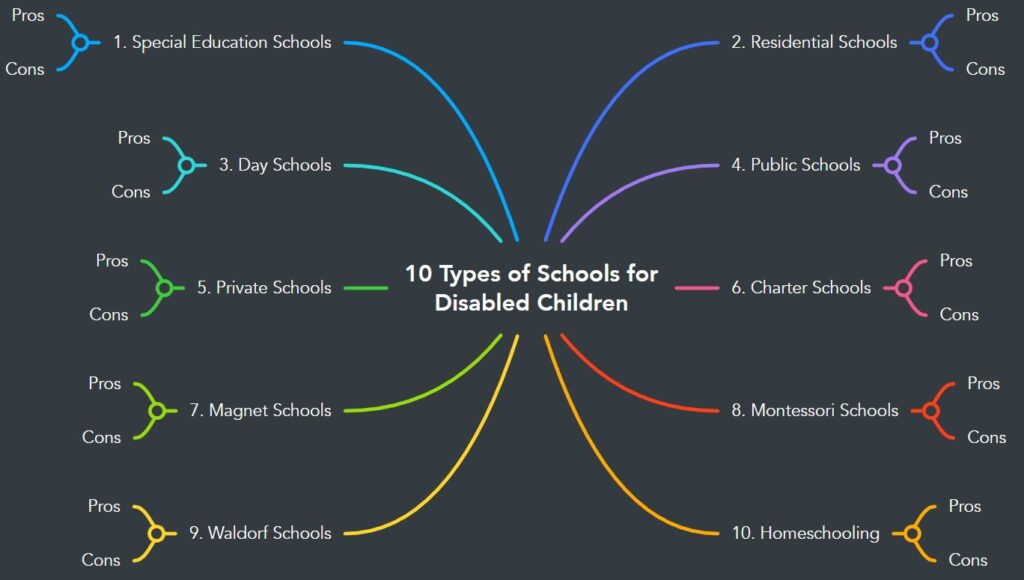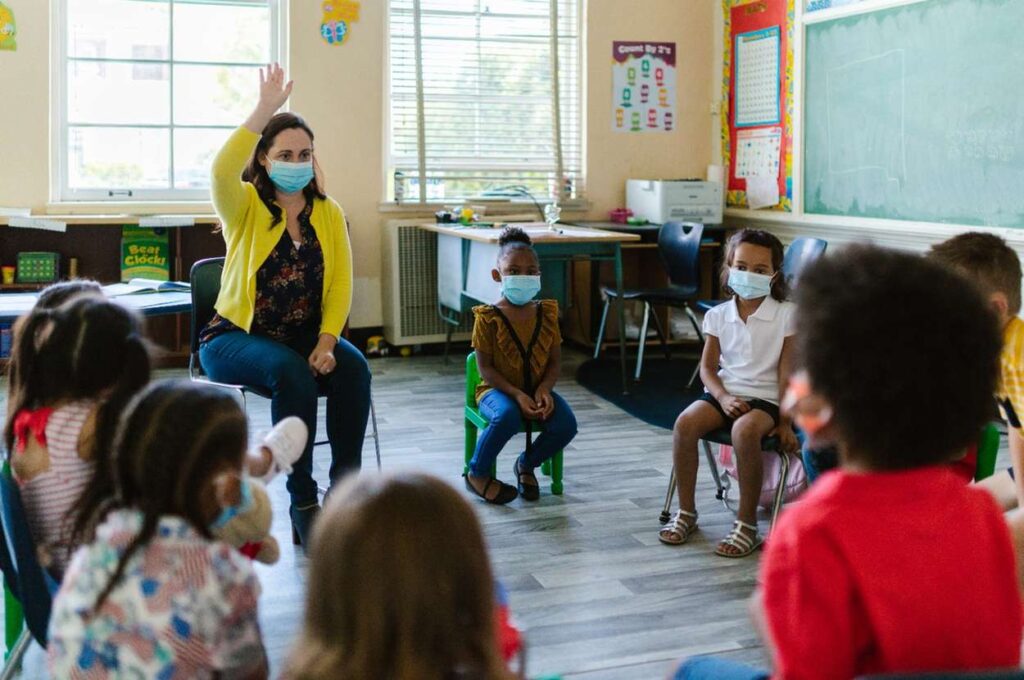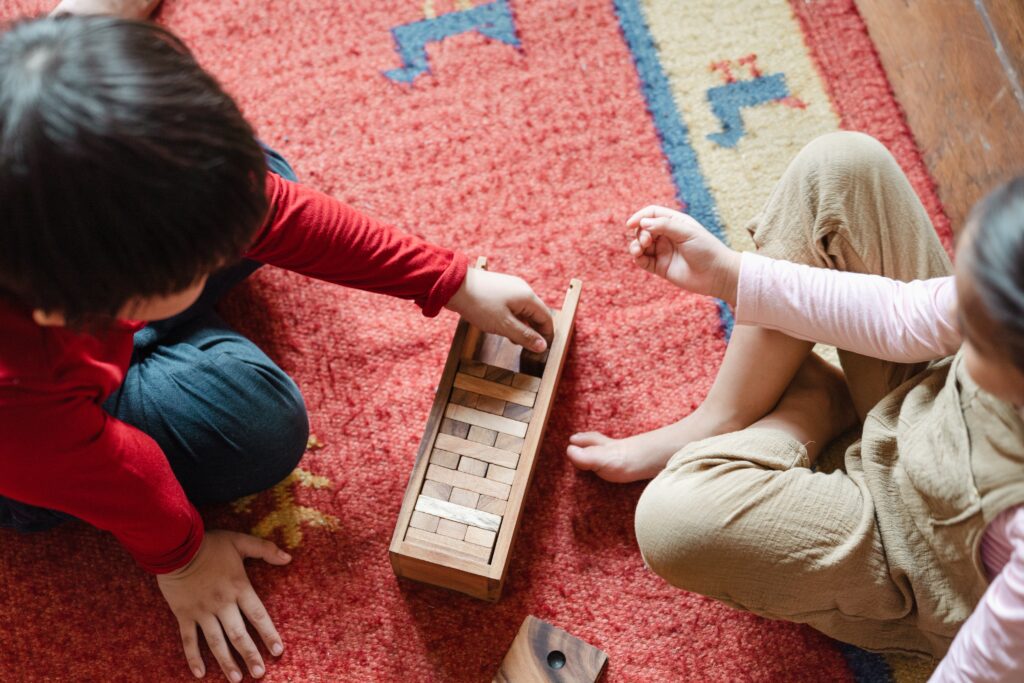As a parent of a child with disabilities, finding the right school can be a daunting task. The educational system can feel overwhelming, confusing, and at times, frustrating.
However, through our research, we have discovered that there are a variety of schools available for children with disabilities, each with its own unique advantages and challenges. In this blog post, We will explore 10 types of schools for disabled children, and share the pros and cons of each. Let’s start.

1. Special Education Schools
These schools offer a specialized curriculum for students with disabilities, with a focus on individualized education plans (IEPs) and tailored support.
- Pros:
- Special education schools are specifically designed to meet the needs of students with disabilities and can provide tailored support to help them succeed.
- Teachers in special education schools have specialized training in working with students with disabilities, which can lead to more effective instruction.
- Special education schools can provide a sense of community and belonging for students with disabilities, who may feel more comfortable around peers who face similar challenges.
- Cons:
- Special education schools can be expensive, and may not be accessible to all families.
- Students in special education schools may be separated from their non-disabled peers, which can limit their opportunities for socialization and inclusion.
- Some special education schools may not offer a full range of academic or extracurricular activities, which can limit students’ experiences.
2. Residential Schools
These schools provide a supportive environment for students with disabilities to live and learn, with 24-hour supervision and care.
- Pros:
- Residential schools can provide a safe and supportive environment for students with disabilities to live and learn, with 24-hour supervision and care.
- Students in residential schools may have access to specialized resources and equipment, such as therapy rooms or adapted transportation.
- Residential schools can provide a sense of community and belonging, with students forming close bonds with peers and staff members.
- Cons:
- Residential schools can be expensive, and may not be accessible to all families.
- Living away from home can be difficult for some students with disabilities, and may cause feelings of homesickness or loneliness.
- Students in residential schools may be isolated from their families and communities, which can limit their opportunities for socialization and connection.
3. Day Schools
These schools provide special education programs during the day, but students return home at the end of the day.
- Pros:
- Day schools allow students with disabilities to receive specialized education while still living at home, which can provide a sense of stability and familiarity.
- Students in day schools may have more opportunities to interact with non-disabled peers and participate in regular school activities.
- Day schools may be more affordable than residential or special education schools.
- Cons:
- Day schools may not provide as much specialized support or resources as other types of schools for students with disabilities.
- Transportation to and from school may be a challenge for some families, especially if the student requires adapted transportation.
- Some day schools may not be able to fully accommodate students with more severe disabilities, who may require more intensive support.
Note: It’s important to remember that these pros and cons are generalizations and that each individual school and student is unique. It’s always a good idea to research and visit different schools to find the best fit for your child’s needs.

4. Public Schools
Public schools are required to provide special education services to students with disabilities and may have specialized programs or classes.
- Pros:
- Public schools are required by law to provide special education services to students with disabilities, which can make them more accessible to all families.
- Public schools may offer a wider range of academic and extracurricular activities than some specialized schools for students with disabilities.
- Public schools may provide opportunities for students with disabilities to interact with a diverse range of peers and learn to navigate the wider community.
- Cons:
- Public schools may not always have the resources or staff to provide effective support to all students with disabilities.
- Students with disabilities in public schools may face stigmatization or bullying from non-disabled peers.
- Some public schools may not be fully accessible to students with physical disabilities or sensory impairments.
5. Private Schools
Private schools may offer specialized programs or curricula for students with disabilities but these may come with additional costs.
- Pros:
- Private schools may offer specialized programs or curricula for students with disabilities and may be able to provide more individualized attention and support than public schools.
- Private schools may have smaller class sizes and lower teacher-to-student ratios, which can lead to more personalized instruction.
- Private schools may be able to provide a more tailored, flexible approach to education, which can be particularly beneficial for students with disabilities.
- Cons:
- Private schools can be expensive, and may not be accessible to all families.
- Private schools may not be required to provide the same level of support or resources for students with disabilities as public schools.
- Private schools may not always be fully inclusive, and may not provide opportunities for students with disabilities to interact with a diverse range of peers.

6. Charter Schools
Charter schools may offer specialized programs or curricula for students with disabilities, but may have limited availability.
- Pros:
- Charter schools may offer specialized programs or curricula for students with disabilities, and may have more flexibility to experiment with innovative teaching methods and approaches.
- Charter schools may be more accessible to families in certain geographic areas or communities, providing more options for students with disabilities.
- Charter schools may have smaller class sizes and more personalized instruction than traditional public schools.
- Cons:
- Charter schools may have limited availability, with long waiting lists or selective admission processes.
- Charter schools may not be required to provide the same level of support or resources for students with disabilities as traditional public schools.
- Charter schools may have less accountability and oversight than traditional public schools, which can lead to disparities in access and quality.
7. Magnet Schools
Magnet schools may offer specialized programs or curricula for students with disabilities, but admission may be competitive.
- Pros:
- Magnet schools may offer specialized programs or curricula for students with disabilities and may have more flexibility to experiment with innovative teaching methods and approaches.
- Magnet schools may have a diverse student body, with students from different backgrounds and communities.
- Magnet schools may have more resources and opportunities than traditional public schools, such as access to technology or extracurricular activities
- Cons:
- Admission to magnet schools may be competitive, and may not be accessible to all students with disabilities.
- Magnet schools may not always provide the same level of support or resources for students with disabilities as traditional public schools.
- Transportation to and from magnet schools may be a challenge for some families, especially if the school is located far away.
8. Montessori Schools
Montessori Schools: Montessori schools offer a child-centered approach to learning, with a focus on individualized instruction and self-directed learning..
- Pros:
- Montessori schools offer a child-centered approach to learning, with a focus on individualized instruction and self-directed learning, which can be beneficial for students with disabilities.
- Montessori schools may have a more relaxed, flexible atmosphere than traditional schools, which can be more comfortable for some students with disabilities.
- Montessori schools may provide opportunities for students with disabilities to develop independence, self-regulation, and problem-solving skills.
- Cons:
- Montessori schools may not be fully equipped to provide specialized support or resources for students with more severe disabilities.
- Montessori schools may not always be accessible to all families and may be more expensive than traditional public schools.
- Montessori schools may have a less structured curriculum, which may not be appropriate for all students with disabilities.

9. Waldorf Schools
Waldorf schools offer a holistic approach to education, with a focus on experiential learning and creativity.
- Pros:
- Waldorf schools offer a holistic, arts-based approach to education, which can be engaging and beneficial for some students with disabilities.
- Waldorf schools may have a focus on social-emotional learning and building relationships, which can be particularly beneficial for students with disabilities.
- Waldorf schools may provide a supportive, nurturing environment, with a focus on individualized attention and relationship building between teachers and students.
- Cons:
- Waldorf schools may not be fully equipped to provide specialized support or resources for students with more severe disabilities.
- Waldorf schools may have a less structured curriculum, which may not be appropriate for all students with disabilities.
- Waldorf schools may be more expensive than traditional public schools, and may not be accessible to all families.
10. Homeschooling
Homeschooling allows for a customized education plan that can be tailored to the specific needs and abilities of the disabled child. This individualized attention can help them learn at their own pace and achieve their full potential.
- Pros:
- Homeschooling can provide a highly individualized, flexible approach to education, which can be particularly beneficial for students with disabilities.
- Homeschooling can provide a safe, supportive environment for students with disabilities, free from bullying or other negative social interactions.
- Homeschooling can allow parents or caregivers to closely monitor and support their child’s learning, and tailor the curriculum to their specific needs.
- Cons:
- Homeschooling can be challenging for parents or caregivers who are not trained educators or who may have limited resources or support.
- Homeschooling can limit opportunities for socialization and interaction with peers, which can be particularly important for students with disabilities.
- Homeschooling may not provide access to specialized support or resources that are available in traditional schools, such as speech or occupational therapy.

Conclusion:
In conclusion, there are different types of schools available for children with disabilities, including inclusive schools, special education schools, residential schools, online schools, and homeschooling. Each type of school offers unique benefits and challenges, and families should carefully consider their options to find the best fit for their child’s needs.
Regardless of the type of school, every child with a disability has the right to a quality education and the opportunity to reach their full potential. For more details on this topic, you can refer to youtube.
For more tips and advice, you can read more articles on our website. We always come up with thoroughly detailed articles on various topics. Some of them are listed below for your reference:
- Toy Story: Exploring the Importance of Toys for Children
- 10 Advantages of Reading Aloud to Children
- The Impact of Screen Time on Kids’ Development and 5 tips to Balance it
- 5 Common Benefits of Outdoor Play for Kids and How to Encourage It.
- Breastfeeding Positions: The 4 Best Breastfeeding Positions for your Baby
- The Impact of Screen Time on Kids’ Development and 5 tips to Balance it
- 5 Common Benefits of Outdoor Play for Kids and How to Encourage It.
FAQs
Understanding the different types of schools available for children with disabilities can help you make informed decisions about their education. So here are some common FAQs:
Q: How do I know which type of school is best for my child with a disability?
- Consider your child’s individual needs and abilities.
- Research the different types of schools and their programs.
- Talk to other parents and disability advocates.
- Visit schools and meet with administrators and teachers.
- Work with your child’s IEP team to develop an appropriate education plan.
Q: Are there any laws that protect the educational rights of children with disabilities?
- Yes, the Individuals with Disabilities Education Act (IDEA) is a federal law that requires public schools to provide free appropriate public education (FAPE) to students with disabilities.
- Section 504 of the Rehabilitation Act of 1973 is another federal law that prohibits discrimination against people with disabilities in programs that receive federal funding, including schools.
- The Americans with Disabilities Act (ADA) is a federal law that prohibits discrimination against people with disabilities in all areas of public life, including education.
